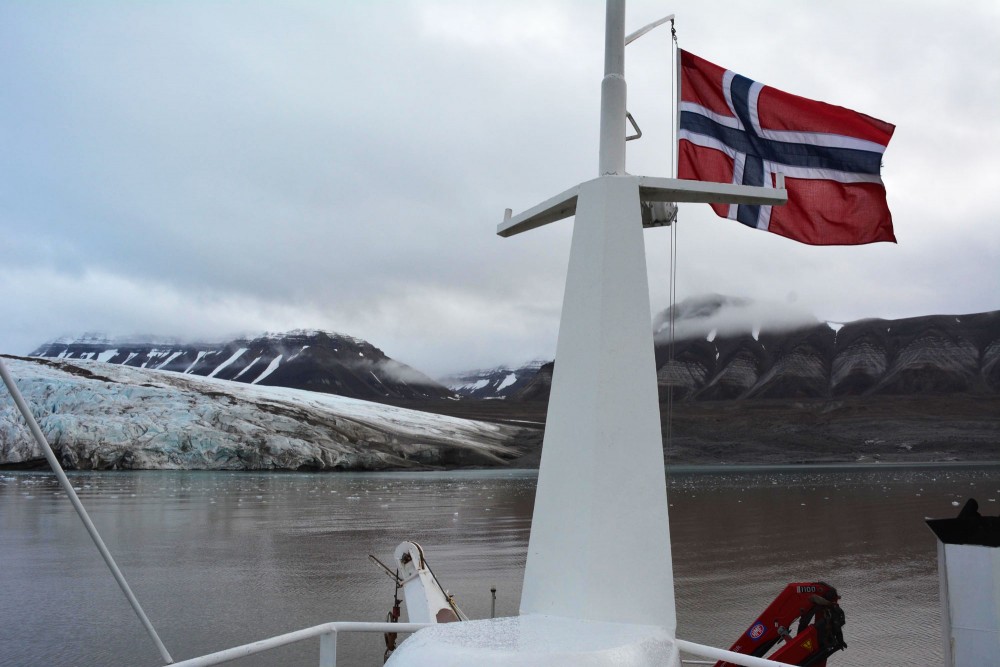
Norway’s Climate Dilemma
ADVERTISEMENT
The UN Security Council (UNSC) has recognized climate change as a threat multiplier. Recently, Norway won a coveted seat at the UNSC for a two-year term. Yet, Norway is wrestling with its own inner conflict: to continue producing oil and gas, business as usual, or set an end date for its oil and gas exploration.

Seen from the outside, Norway seems an exemplary nation – scoring highly on quality of life, income per capita, and care for the environment – all backed by a huge sovereign wealth fund. The Government Pension Fund Global (the Fund), which saves revenue from oil and gas production (the mainstay of the national economy), is now valued at one-trillion US dollars.
However, the climate crisis has overshadowed the Norwegian success story. In order to stay below the 2º C limit stipulated in the Paris Agreement, eighty-two percent of all proven global fossil fuel reserves must stay in the ground. Why then has Norway announced its intention to grant further licenses for drilling in the Arctic in 2021.
Norway is not immune to climate change. The direct climate change impacts are already evident, including more extreme storms, flooding, drought, shrinking glaciers, and unprecedented high temperatures in Svalbard (Spitsbergen). The indirect effects of the climate crisis will be more difficult to cope with for a small nation like Norway (population: 5 million) with an open economy that depends on trade and international stability. The global chaos caused by the climate crisis could lead to more isolationism, millions of climate migrants, greater conflicts, and less trade.
Norway has joined other non-permanent UNSC members to persuade the same body to take more action on the global security implications of the effects of climate change. How can Norway take up its new position while openly increasing the risk of climate change; It continues to be the third largest producer of natural gas in the world and the eighth largest oil producer.
The Norwegian government argues that its emissions make up only a small part of global CO2 emissions; hydropower accounts for nearly all of Norway’s domestic electricity production, and nearly sixty percent of new cars sold are electric. The government emphasizes that Norwegian production of oil and gas is “cleaner” than other producers. Yet, no matter how “clean” the production process, fossil fuels emit twenty times more greenhouse gases when they are inevitably burned than during the production phase.
Can the Norwegian people decry the same fossil fuel industry that enabled their economic prosperity? A whole generation of Norwegians is growing up believing the misinformation spread by the fossil fuel industry’s advertising campaigns: that the nation cannot function without the oil and gas industry. However, the state’s fiscal budget is paid for by the financial return of the Fund (not the capital) and other sources. Environmental groups, some minor political parties and most of the youth groups of Norway’s major parties have argued that the nation must set an end date for its oil and gas exploration if the country is to do its part to avoid the worst effects of climate change.
ADVERTISEMENT
Greenpeace and its co-plaintiff, Nature & Youth, sued the Norwegian government in 2016, claiming that its decision earlier that year to grant oil production licenses in the Arctic was unconstitutional. The Norwegian Constitution contains an environmental provision, Article 112, stipulating the right to a natural and healthy environment for current and future generations. The two lower level courts in the case have acknowledged that Article 112 does, in fact, constitute a substantive right, not just an aspirational statement. Nature & Youth has stated that, “we can’t afford to drill for new oil.” The case will be heard by the Norwegian Supreme Court, beginning on November 4th.
In the face of COVID-19, politicians and other lawmakers now understand that global catastrophe can occur without armed conflict. The same goes for climate change, but at a deceptively slower pace. I hope that in joining the UN Security Council on January 1st, 2021, Norway will resolve its inner conflict by following the suggestion of the independent Climate Transition Committee to no longer grant licenses for new areas of exploration. If Norway is to do its part in upholding the Paris Agreement, it has to transition quickly, moving from offshore oil and gas rigs to offshore wind farms and other renewable energy sources.
As with COVID-19, we need to “flatten the curve” of CO2 emissions. The effects of the climate crisis are devastating, already starkly affecting human lives, and exacerbating global conflicts into the future. Unfortunately, there is no vaccine for climate change – and COVID-19 is merely a dress rehearsal.
Anita Margrethe Halvorssen, JSD, LLM, Columbia University, is a former Adjunct Professor at University of Denver, where she taught Global Climate Law and Policy, former Legal Counsel at the Norwegian Ministry of Climate and Environment, and the Director of Global Legal Solutions, LLC.
ADVERTISEMENT
The Barents Observer Newsletter
After confirming you're a real person, you can write your email below and we include you to the subscription list.

